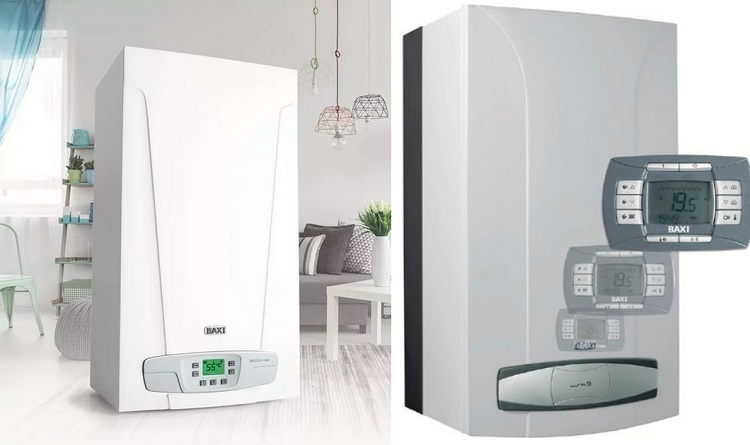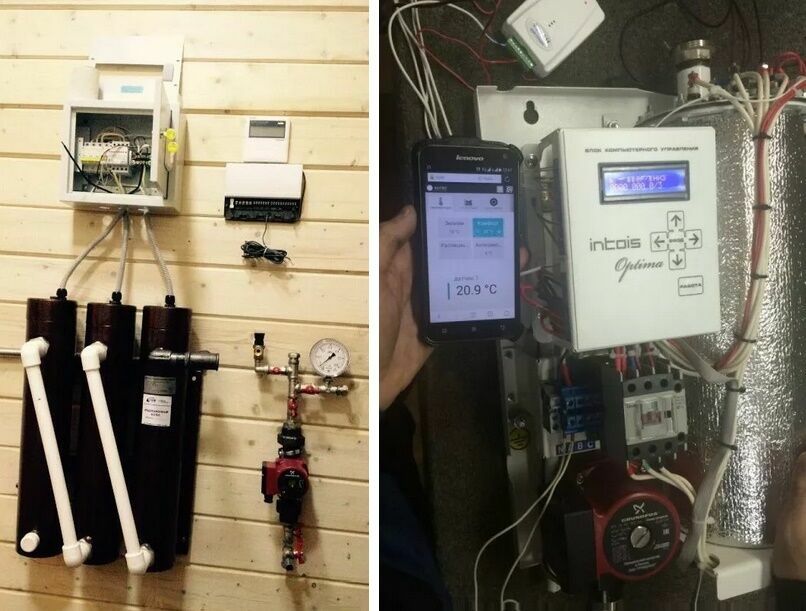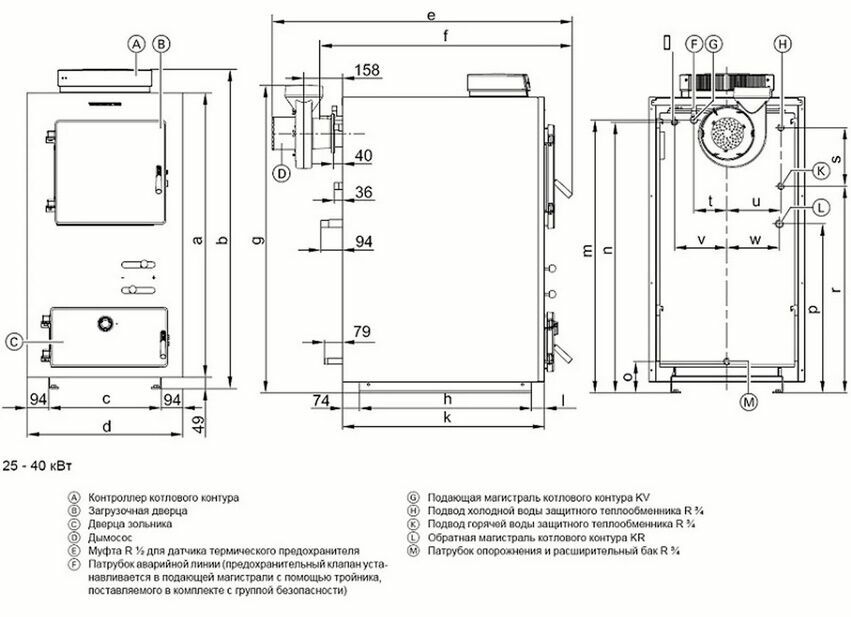The principles of alternative energy are increasingly gaining the attention of consumers. In many ways, this is facilitated by the growth of tariffs for traditional energy sources, as well as periodic disruptions in the market for services.
In these circumstances, the hydrogen heating boiler is considered as one of the most promising types of devices operating on renewable fuel, which is gas H2.
Before deciding to purchase such a unit, it is necessary to become familiar with the principle of its operation, to evaluate the advantages and disadvantages of using hydrogen as a fuel. These questions are studied by us and set forth in detail in the article.
In addition, we outlined the parameters that should be taken into account when choosing a boiler, gave advice on operation and prepared an overview of the best factory-made hydrogen generators. Fans of homemade handy instruction manual assembly unit with their own hands.
The content of the article:
- Properties of hydrogen as a fuel
- Advantages and disadvantages of hydrogen boilers
- The principle of operation of the heating unit
- Components of a hydrogen plant
- Generator selection criteria
- Boiler Operation Tips
- Top 5 factory-made hydrogen generators
- How to make a boiler yourself
- Which water is better - plain or distilled?
- Conclusions and useful video on the topic
Properties of hydrogen as a fuel
As mentioned above, the fuel for such aggregates is hydrogen, the easiest gas in nature, which does not have color and smell. Among its advantages are a large amount of heat that is released during the combustion of H2 (121 MJ / kg, while burning propane produces only 40 MJ / kg).
Under normal conditions, hydrogen burns at a temperature of + 2000 ° C, but with the help of a catalyst it can be reduced to + 300 ° C. This makes it possible to manufacture boilers from low-cost steel, and not from expensive rare-earth metals.
Hydrogen is non-toxic, which ensures the safety of its use in everyday life. When this substance is burned, water vapor is produced, which improves the indoor climate and does not need chimneys.

When using hydrogen, one should strictly observe the safety rules: if the gas is used incorrectly or contact with an open fire, a destructive explosion may occur.
The disadvantages include the increased explosiveness of hydrogen, especially when mixed with air or oxygen, which leads to the formation of detonating gas.
Advantages and disadvantages of hydrogen boilers
The strengths of such devices are:
- Complete environmental friendliness. Water decomposition products do not harm the atmosphere; they are completely safe for the health of people and pets.
- High efficiencywhich can reach 96%. This is significantly higher than the efficiency of diesel, natural gas or coal.
- Saving natural resources due to the application alternative energy sources.
- Low price calories. For such devices enough water and some electricity.
At the same time, such devices have weaknesses.
Among the minuses should include the following nuances:
- Demanding Service. For the highest possible degree of output H2, it is necessary to replace metal plates every year. In addition to replacing the electrodes, a catalyst must be added regularly to produce the planned amount of energy. The frequency of this procedure depends on the power, as well as on the characteristics of a particular model.
- High cost - the factory setting will cost no less than 35-40 thousand rubles.
- Explosion hazard with increasing normalized pressure in the boiler.
- Lack of hydrogen cylinders - they are rarely found on sale.
- Limited choice. Since such heaters are not very common in the Russian market, it is not always possible quickly find a suitable model, as well as find competent specialists for installation and repair equipment.
- The need to supply communications. To operate the device, it is necessary to have a permanent connection to the power supply for the implementation of the electrolysis reaction, as well as to the water source, the flow rate of which depends on the power of the device.
It is necessary to mention that manufacturers pay great attention to new technologies, seek to improve hydrogen boilers, eliminating or minimizing the disadvantages.
The principle of operation of the heating unit
Due to its activity H2 It is not found in its pure form in nature, but it is sufficient to simply isolate it from ordinary water by electrolysis, while gaseous oxygen is also released.

On the presented image you can see a schematic device of heating equipment working on hydrogen, with an indication of all the structural elements (+)
For the heater to function, you first need to get H2. This takes place in a special compartment designated for the occurrence of a similar reaction. Liquid is poured into the container where the metal plates are immersed.
They are supplied with electric current of specially selected purity, under the influence of which H is released.2 and about2as well as a by-product - water vapor.
The resulting mixture is passed through a special device - a chemical separator, with which it is possible to isolate the hydrogen, separating it from other impurities. The purified gas is fed to the burner, on which the valve is installed.
It prevents the movement of H2 in the other direction that prevents an explosion. In this case, oxygen and water vapor through another system will fall off into a special container.
Next, the hydrogen gas passes through the protection unit and enters the combustion chamber. Here it reacts with gas in the presence of a catalyst, as a result of which heat is generated, which through the heat exchanger enters the house heating system.
Water vapor released in the chamber is returned via a dedicated channel to the electrolyte reservoir, thus using the recirculation process.
Power adjustment is carried out using specially equipped channels, the number of which can reach six. A catalyst is contained within each of these devices, so that when turned on, the heat generation process starts.
The gas flow, heated to a temperature of 40 ° C, begins to move to the heat exchanger located in the combustion chamber.
Due to the separate structures, the channels can act independently of each other, which allows to include only a part of them.

The process of obtaining hydrogen in modern electrolysis apparatus is fully automated. The only manual process is to pour water into the system.
Modern models are also equipped with various devices, for example, indicators of water level and sensors pressure, which allows them to work in automatic mode and respond urgently to unforeseen situations.
Components of a hydrogen plant
The device system for heating, functioning on hydrogen, is quite simple.
Boiler, playing the role of a heat exchanger, is the main element where hydrogen production takes place.

A hydrogen-powered boiler can be assembled from the available elements, and only plain or distilled water (+) is needed for its operation.
Electrolizer - the main active part of the boiler, where the electrolytic reaction takes place, leading to the decomposition of water into H2 and about2. The element is a tank filled with water, in which metal electrodes are placed, which have the maximum conductivity of the current.
Wires are connected to plates by which electricity supply is carried out.
Burner - a device that contributes to the heating of the coolant in the heating system. It is located in the combustion chamber, a spark is supplied to ignite it.
Burner valve - A special part located at the top of the device. Thanks to this detail H2, rising to the top, easily overcomes the barrier inaccessible to other released substances, and enters directly into the burner.

In the factory hydrogen boilers, a control unit is provided. The panel displays the indicators of voltage and current, power control and levers for setting other operating parameters.
Pipeline - communications that depart from the unit and are used to supply heat to all areas of the house. For strapping use heating pipes with a diameter of 25-32 mm. When laying follow the fundamental rule: the diameter of each subsequent branching should be less than the previous one.
Generator selection criteria
When deciding to purchase such a technique, it is important to pay attention to the following criteria.
Power. In modern devices, the value of this indicator can vary considerably, which allows you to choose the best option for a small house, and for a two-, three-storey building.

The average water consumption in modern models of the generator is not too large. Within 24 hours, about 5.5 liters will be needed for the device to function, which will generate 1.2-2 liters of fuel.
Number of contours. On devices operating on hydrogen, a heating circuit is usually installed. In some models, an additional installation of the second (heating) circuit is also provided.
Power consumption level. Today's technology allows us to achieve excellent heat performance when using a minimum of electricity. The power consumption of various types of generators varies from 1.2 to 3 kW per 1 hour.
Low energy consumption is achieved due to the fact that the hydrogen boiler does not work continuously, but only to maintain a certain temperature in the room.
Power supply. All types of hydrogen generators can be divided into two broad categories: one is powered by gas and the other by electricity.
Manufacturer. It is better to prefer proven manufacturers (Italy, USA). It is necessary to be afraid of the low-quality products offered by dubious enterprises at extremely low prices.
Boiler Operation Tips
To improve the functionality of the unit, it is important to adhere to the attached instructions. It is possible to improve the operation of the device by adding additional details (herewith, safety rules should be strictly followed).

A flame sensor mounted on the burner improves system safety. When the fire decays, the device automatically blocks the flow of flammable gas into the burner, thereby preventing it from entering the room
You can install special sensors in the interior of the heat exchanger to monitor the increase in water heating, as well as to supplement the design of the burner with stop valves.
Just connect it directly to temperature sensorso that the boiler is automatically turned off as soon as the heating reaches the set point.
It is also useful to install a device for normalized cooling of the boiler.

Devices on hydrogen can be used not only as the only heating equipment in the house, but also to be combined with other heating systems. In this case, the main heat installations can operate in the low-temperature mode.
In the case of compliance with the standards of operation of the unit, working on hydrogen, will serve more than a dozen years. Although the warranty period of such devices is 15 years, in practice they can work well for 20-30 years.
Repairing such devices will not be difficult for an experienced master, since the concept of a hydrogen boiler is not very different from analogs operating on other types of fuel.
Top 5 factory-made hydrogen generators
The first company that manufactured and patented the technology for manufacturing a hydrogen fuel boiler was the Italian company. Giacomini. She specializes in devices based on ecological methods of producing energy: geothermal pumps, solar panels, and others.

H2ydroGEM is a catalytic combustion chamber, in each horn of which there is a substance that accelerates the hydrogen combustion reaction. Due to this, the process takes place at a relatively low temperature.
Currently, these models are manufactured by American, Chinese, European companies, however, their range is not too wide compared to boilers operating in other types fuel.
The best factory models of hydrogen systems
Among the most popular models we note:
- MegaTank100 - generator, powered by electricity from the network. It has a reliable multi-level system of protection against overheating and short-circuiting, which guarantees safe and productive work. The cost of the model depends on its configuration.
- STAR-2000 - an expensive unit (> 200,000 rubles) has excellent technical characteristics. Despite the fact that this generator consumes a minimum of energy, it is able to heat a room of 251-300 square meters.
- Kingkar - A mains operated appliance with excellent working properties. The cost of the model is quite high - about 100 thousand rubles, but it is reimbursed by economical energy consumption.
- H2-2 - Italian extra-class equipment at a high price (about 250,000 rubles). allowing to heat the air in large spaces (from 300 m3 and above) with minimal electricity consumption.
- Free energy - high-quality devices at a democratic cost in the range of 15-35 thousand rubles (the price depends on the power and other characteristics). Equipped with a control unit that automates many processes, multi-level sensor voltage and pressure control.
There are also other models in different price categories.
How to make a boiler yourself
Generators of heating have rather easy design. With a known skill level, you can assemble the device yourself. At the same time, due to the explosiveness of the hydrogen mixture, such work requires extraordinary responsibility, knowledge of safety engineering and installation experience of such devices.

With self-manufacturing device will not be able to get rid of substantial financial costs, since some of the components are better to buy ready-made. High risk makes you think about factory settings, for which manufacturers give long-term guarantees
The process of making your own hydrogen boiler can be divided into several stages.
Step # 1 – drawing and preparation of materials. First of all, similar projects should be found on the Internet in order to develop on their basis a device that would meet all the conditions and possibilities.
It is necessary to accurately calculate all the indicators, and above all, the required power, as well as to decide on the materials that will be used to manufacture the boiler. The best option is considered ferromagnetic alloys, but it is quite suitable capacity, made of stainless steel.
Although a hydrogen generator can have different designs, the following details remain the same:
- 12 volt power source;
- tank where the structure will be located;
- PWM regulator with a capacity of at least 30 A;
- several tubes of different diameter, made of steel, stainless steel;
- steel sheet;
- hacksaw;
- gas-burner - Better ready, purchased in the store.
Step 2 – electrolyte production. For the manufacture of plates, which will be equipped with an electrolyzer, you need to take a sheet of steel of medium thickness. Using scissors for metal, a hacksaw or other tool, it is cut into equal strips in the amount of 18 or more pieces (the number must be necessarily even).
From the reverse country in each of them it is necessary to drill holes for the bolts that will be needed to keep these elements in the electrolyte completely stationary.
All plates are divided into anodes and cathodes, depending on this division, wires are connected to them, respectively, transmitting positive and negative charges.
The use of direct current is more effective than the use of alternating current. As its source, it is best to use a PWM type generator.
Step number 3 – cell assembly. The best material for the manufacture of this element is stainless steel. A solid construction of rectangular or square shape is welded from metal, after which water or a mixture of H is poured into it.2O with the catalyst, and also prepared plates with the connected conductors are placed.
Step 4 – burner connection. A burner is mounted in the upper part of the device - it is better to use the purchase model, which can be purchased in a specialized store.
Step number 5 – installation and connection of a separatorwhich is necessary for the separation of hydrogen from the gas mixture.
Finally, a tube is laid on which H2 will rise to the burner, and also connect the elements that remove heat and distribute it throughout the house.
Which water is better - plain or distilled?
One of the questions that owners of hydrogen boilers often ask is about the water used to operate the devices.

Distilled water to operate the hydrogen boiler can be purchased in stores or set up its production independently, using a simple installation.
According to experts, the best performance factory or homemade devices demonstrate when working on distilled water, to which very little sodium hydroxide is added (for 10 liters of H2O - one table spoon).
However, the hydrogen boiler can successfully operate on tap water, the main thing is that it does not contain salts of heavy metals.
Conclusions and useful video on the topic
In the video below, you will see an overview of the model of a gas boiler operating on hydrogen fuel, produced by the famous Korean company DAEWOO.
It is not without reason that hydrogen is called the fuel of the future: this gas can become an almost unlimited resource of cheap, environmentally friendly fuel that can be used in different installations.
A hydrogen-fired boiler, manufactured in factory or independently, will allow you to create an autonomous heating system. This will help to significantly reduce payments in housing and communal services, decide on the maintenance of a comfortable temperature in living rooms and utility rooms.
Have experience using hydrogen as a fuel? Want to ask questions on the topic or tell about your invention? Please comment on the publication, participate in discussions and post photos of your homemade products. The feedback block is located below.


